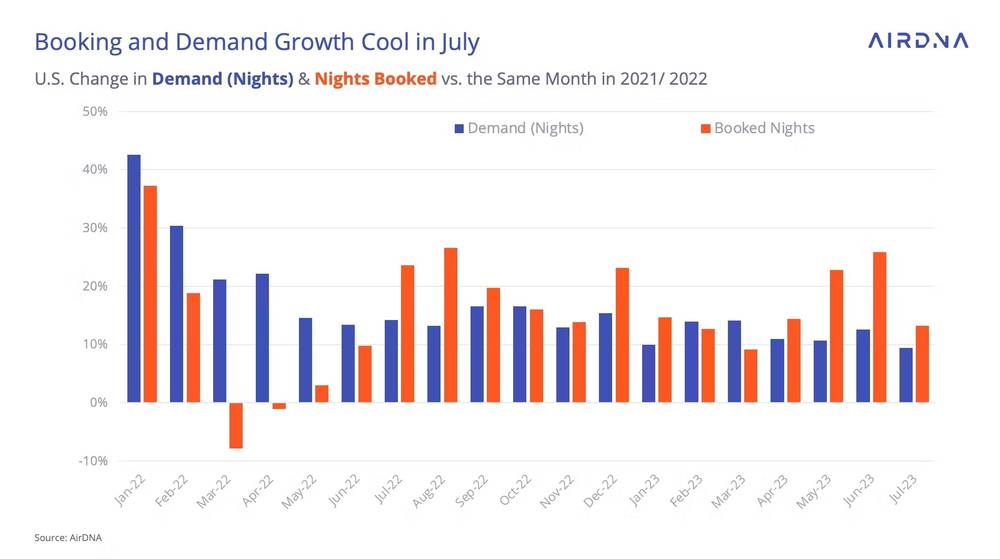As travel spending improves and people continue to travel for leisure, there’s been an increase in demand for short-term rentals like Airbnb.
Despite an inflationary environment and worries of possible weakening in the U.S. economy, travelers don’t seem to be deterred. July broke the record for the most short-term rental stays in one month in the U.S., with 35.4 million nights, according to data from data analytics company AirDNA.
In other words, those hosting Airbnb and other short-term rentals had a stellar summer. And if the data is to be believed, demand likely won’t let up anytime soon.
Short-Term Rentals Are in Demand Despite July Cooling
Total demand (nights stayed) and nights booked for a future date rose in July. Demand was up 9.4% compared to the prior year, while nights booked jumped 13.2%.
While demand for short-term rentals was on the rise compared to last year, it was still slightly down compared to June. However, as July is usually the highest month of demand for bookings, it doesn’t necessarily mean that there is a downward trend. In fact, bookings for the months of September through November are already up 10% of what they were at the same period in 2022, according to AirDNA.
In fact, since March, there has been an increase each month of 2 million nights stayed than the same month in 2022. July alone saw an increase of 2.1 million nights compared to the year prior.

Where People Are Traveling and Staying
The demand for short-term rentals varied slightly depending on location in July. Small city and rural locations have seen a large uptick in demand growth over the last few months, while larger cities and urban areas have faced steeper competition from international markets as more Americans are traveling abroad after a steep decline during the pandemic.
So what were the hottest markets in July? Surprisingly, it was also in the areas with the hottest months on record.

Demand for stays in the Phoenix/Scottsdale, Arizona, area was up 36% year over year, followed by Coachella Valley, California, which rose 29.8% despite an average daily high temperature of more than 113 degrees. What’s even more interesting is that the summer months are the off-season for these areas. Phoenix, for example, only hosted about 60% of its March total in July.
Meanwhile, some Florida markets that normally see a lot of summer family vacations saw smaller increases or even a loss in demand, as was the case in Orlando, where demand fell 12.2% compared to the prior year. Still, average daily rates were down 1% overall from last year, with the biggest increase in coastal cities like New York, Los Angeles, and Long Island.
What This Means for Real Estate Investors
While demand has increased for bookings, the supply of short-term rentals has slowed. In July, the pace of supply rose only 12.1% year over year, a far slower pace than July 2022’s growth of 24.4% year over year.

Part of that is likely due to factors impacting the overall real estate market right now: an overall decrease in housing supply, increased interest rates leading to high mortgage payments, and lower occupancy rates.
Still, this might be good news for current short-term operators. With less monthly listings but a strong demand for overnight stays, it means there is a bit more balance in the short-term market.
For real estate investors looking to expand into short-term housing, the data is promising. While there are still other market factors to consider, such as skyrocketing mortgage rates, the Airbnb market is likely to grow as domestic travel continues into the holiday months.
In other words, there may be opportunities for investors looking to expand into the short-term rental space.
The Bottom Line
The short-term rental market continues to grow. A dip in supply has been welcome news to current holders, who have seen an increase in bookings compared to the year before. Still, there may be room for real estate investors looking to expand into the short-term rental space. With travel at pre-pandemic levels and the holiday season coming up in the next few months, the rest of the year is likely to be a busy one for short-term rentals.
Ready to succeed in real estate investing? Create a free BiggerPockets account to learn about investment strategies; ask questions and get answers from our community of +2 million members; connect with investor-friendly agents; and so much more.
Note By BiggerPockets: These are opinions written by the author and do not necessarily represent the opinions of BiggerPockets.
